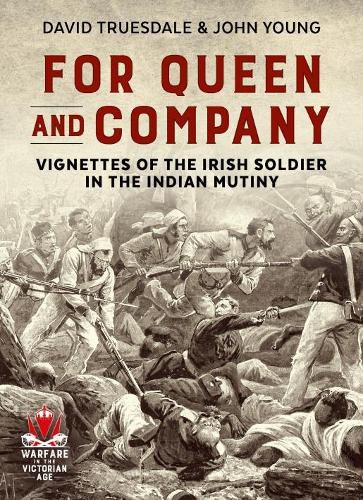Readings Newsletter
Become a Readings Member to make your shopping experience even easier.
Sign in or sign up for free!
You’re not far away from qualifying for FREE standard shipping within Australia
You’ve qualified for FREE standard shipping within Australia
The cart is loading…






This book records the actions of those Irish soldiers (and others) who were awarded the Victoria Cross in the event known to the British public in 1857 as ‘The Indian Mutiny’. Since then, revisionist historians have applied other names to what occurred: a ‘war of independence’, ‘a revolt’, or ‘a great rebellion’… none of these are accurate for the events that began in Meerut on Sunday, 10 May 1857: it was a mutiny; when soldiers refused a lawful command, it was a mutiny. Those former members of the Indian regiments were mutineers and those civilians who joined or supported them were rebels… these were the words of the time and, in recounting the activities of the time, these are the words that should be used. It took two and a half years to quell the Mutiny, and more than half the regiments of the British Army would, at some stage, see action - and this involved only the Indian troops in one of three Presidencies. While many regimental records show the names of those men who were wounded, or who died of disease or were killed in action - allowing a total number to be calculated - the overall cost to the native populations of Indian towns and villages can only be guessed at.
$9.00 standard shipping within Australia
FREE standard shipping within Australia for orders over $100.00
Express & International shipping calculated at checkout
This book records the actions of those Irish soldiers (and others) who were awarded the Victoria Cross in the event known to the British public in 1857 as ‘The Indian Mutiny’. Since then, revisionist historians have applied other names to what occurred: a ‘war of independence’, ‘a revolt’, or ‘a great rebellion’… none of these are accurate for the events that began in Meerut on Sunday, 10 May 1857: it was a mutiny; when soldiers refused a lawful command, it was a mutiny. Those former members of the Indian regiments were mutineers and those civilians who joined or supported them were rebels… these were the words of the time and, in recounting the activities of the time, these are the words that should be used. It took two and a half years to quell the Mutiny, and more than half the regiments of the British Army would, at some stage, see action - and this involved only the Indian troops in one of three Presidencies. While many regimental records show the names of those men who were wounded, or who died of disease or were killed in action - allowing a total number to be calculated - the overall cost to the native populations of Indian towns and villages can only be guessed at.